-
×
 The Irish Identity: Independence, History, and Literature By Marc Conner
1 × $5,00
The Irish Identity: Independence, History, and Literature By Marc Conner
1 × $5,00 -
×
 Resonance Healing with Pendulums By Erich Hunter & Clarissa Barrazza - Pendulum Alchemy
1 × $31,00
Resonance Healing with Pendulums By Erich Hunter & Clarissa Barrazza - Pendulum Alchemy
1 × $31,00 -
×
 Reading Biblical Literature: Genesis to Revelation By Craig Koester
1 × $5,00
Reading Biblical Literature: Genesis to Revelation By Craig Koester
1 × $5,00 -
×
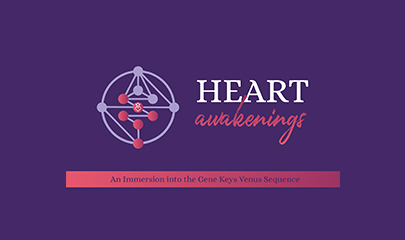 Heart Awakenings By Unlock Your Design Academy
1 × $46,00
Heart Awakenings By Unlock Your Design Academy
1 × $46,00 -
×
 Behavioral Couples Therapy With Richard Stuart
1 × $8,00
Behavioral Couples Therapy With Richard Stuart
1 × $8,00 -
×
 Product Marketing Resume Boost By Melinda Chung
1 × $23,00
Product Marketing Resume Boost By Melinda Chung
1 × $23,00 -
×
 Agency Partner Program By Jason Wardrop
1 × $15,00
Agency Partner Program By Jason Wardrop
1 × $15,00 -
×
 Understanding the Dark Side of Human Nature By Daniel Breyer
1 × $5,00
Understanding the Dark Side of Human Nature By Daniel Breyer
1 × $5,00 -
×
 Infield Mastery Program By Matt Artisan
1 × $69,00
Infield Mastery Program By Matt Artisan
1 × $69,00 -
×
 PUA Cribs: Project Bel-Air by Johnny Wolf
1 × $5,00
PUA Cribs: Project Bel-Air by Johnny Wolf
1 × $5,00 -
×
 The Everyday Gourmet: Making Healthy Food Taste Great By Bill Briwa & Connie Guttersen
1 × $5,00
The Everyday Gourmet: Making Healthy Food Taste Great By Bill Briwa & Connie Guttersen
1 × $5,00 -
×
 Thumbnail University By Film Booth
1 × $5,00
Thumbnail University By Film Booth
1 × $5,00 -
×
 Relationships Revival By Relationships Mastered
1 × $69,00
Relationships Revival By Relationships Mastered
1 × $69,00 -
×
 Sacred Success Coaching Method By Eden Carpenter
1 × $139,00
Sacred Success Coaching Method By Eden Carpenter
1 × $139,00 -
×
 Million Dollar Masterclass By Eileen Wilder
1 × $85,00
Million Dollar Masterclass By Eileen Wilder
1 × $85,00 -
×
 The Everyday Gourmet: How to Master Outdoor Cooking By Bill Briwa & Patrick Clark
1 × $5,00
The Everyday Gourmet: How to Master Outdoor Cooking By Bill Briwa & Patrick Clark
1 × $5,00 -
×
 Metabolic And L1 Fundamentals Bundle By MovNat
1 × $101,00
Metabolic And L1 Fundamentals Bundle By MovNat
1 × $101,00 -
×
 PowerPoint Pro 3.0 (PowerPoint And VBA) 2024 By Breaking Into Wall Street
1 × $46,00
PowerPoint Pro 3.0 (PowerPoint And VBA) 2024 By Breaking Into Wall Street
1 × $46,00 -
×
 The Performance Stretch System Level 1 By The Stretch Therapists
1 × $139,00
The Performance Stretch System Level 1 By The Stretch Therapists
1 × $139,00 -
×
 How to Use Brain Science to Help Patients Accelerate Healing after Trauma By NICABM
1 × $39,00
How to Use Brain Science to Help Patients Accelerate Healing after Trauma By NICABM
1 × $39,00 -
×
 Playing Guitar like a Pro: Lead, Solo, and Group Performance By Colin McAllister
1 × $5,00
Playing Guitar like a Pro: Lead, Solo, and Group Performance By Colin McAllister
1 × $5,00 -
×
 Affiliate Marketing Business Blueprint By David Sharpe
1 × $31,00
Affiliate Marketing Business Blueprint By David Sharpe
1 × $31,00 -
×
 The Everyday Gourmet: Making Great Meals in Less Time By Bill Briwa
1 × $5,00
The Everyday Gourmet: Making Great Meals in Less Time By Bill Briwa
1 × $5,00 -
×
 Foundations of Western Civilization II: A History of the Modern Western World By Robert Bucholz
1 × $5,00
Foundations of Western Civilization II: A History of the Modern Western World By Robert Bucholz
1 × $5,00 -
×
 Ghost Hunting & Paranormal Investigation with your Pendulum By Pendulum Alchemy
1 × $31,00
Ghost Hunting & Paranormal Investigation with your Pendulum By Pendulum Alchemy
1 × $31,00 -
×
 Secrets Of Subtle Sales Mastery Deluxe By Paul Ross
1 × $23,00
Secrets Of Subtle Sales Mastery Deluxe By Paul Ross
1 × $23,00 -
×
 SATYA 3 - Online Immersion - March 2023 By Tias Little
1 × $225,00
SATYA 3 - Online Immersion - March 2023 By Tias Little
1 × $225,00 -
×
 This Day in History: August By Wondrium
1 × $5,00
This Day in History: August By Wondrium
1 × $5,00 -
×
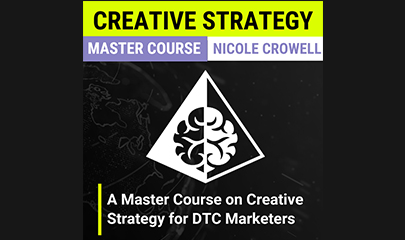 Creative Strategy Master Course By Nicole Crowell
1 × $54,00
Creative Strategy Master Course By Nicole Crowell
1 × $54,00 -
×
 Whole-Foods Plant-Based Cooking By Amy Symington
1 × $6,00
Whole-Foods Plant-Based Cooking By Amy Symington
1 × $6,00 -
×
 7 Figure Sales Training and Script Bundle By Eric Cline
1 × $319,00
7 Figure Sales Training and Script Bundle By Eric Cline
1 × $319,00 -
×
 UI Design and Figma Mastery By Arash Ahadzadeh
1 × $5,00
UI Design and Figma Mastery By Arash Ahadzadeh
1 × $5,00 -
×
 The Federal Code Government Contracting By Jason White
1 × $23,00
The Federal Code Government Contracting By Jason White
1 × $23,00 -
×
 The Absolute Power of Blend If By Blake Rudis
1 × $5,00
The Absolute Power of Blend If By Blake Rudis
1 × $5,00 -
×
 2 Phase AI Trade Spy Total Immersion Experience By Jeff Bierman - The Quant Guy
1 × $209,00
2 Phase AI Trade Spy Total Immersion Experience By Jeff Bierman - The Quant Guy
1 × $209,00 -
×
 Website Design Course by Josh Hall
1 × $5,00
Website Design Course by Josh Hall
1 × $5,00 -
×
 Ultimate Guide to HARO Success By Easy Peasy Blogging
1 × $15,00
Ultimate Guide to HARO Success By Easy Peasy Blogging
1 × $15,00 -
×
 Training Session - Side Control Attacks by Renzo Gracie
1 × $6,00
Training Session - Side Control Attacks by Renzo Gracie
1 × $6,00 -
×
 Core Financial Modeling 2024 By Breaking Into Wall Street
1 × $69,00
Core Financial Modeling 2024 By Breaking Into Wall Street
1 × $69,00 -
×
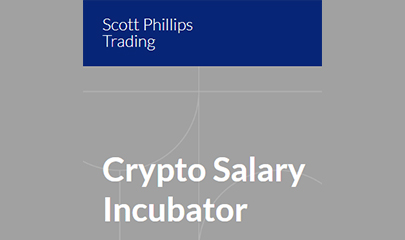 Crypto Salary Incubator By Scott Phillips
1 × $69,00
Crypto Salary Incubator By Scott Phillips
1 × $69,00 -
×
 Lost Christianities: Christian Scriptures and the Battles over Authentication By Bart Ehrman
1 × $5,00
Lost Christianities: Christian Scriptures and the Battles over Authentication By Bart Ehrman
1 × $5,00 -
×
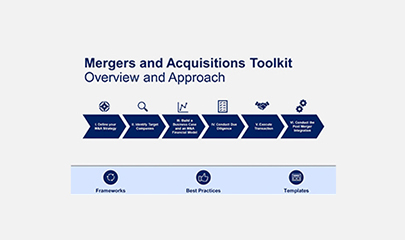 Mergers and Acquisitions Toolkit By Domont Consulting
1 × $23,00
Mergers and Acquisitions Toolkit By Domont Consulting
1 × $23,00 -
×
 Investment Banking Networking Toolkit 2024 By Breaking Into Wall Street
1 × $39,00
Investment Banking Networking Toolkit 2024 By Breaking Into Wall Street
1 × $39,00 -
×
 Corporate Restructuring By Wall Street Prep
1 × $85,00
Corporate Restructuring By Wall Street Prep
1 × $85,00 -
×
 The Power of Boldness 2023 By Naveen Jain - MindValley
1 × $6,00
The Power of Boldness 2023 By Naveen Jain - MindValley
1 × $6,00 -
×
 Fitness Business Essentials Bundle By Carroll Performance
1 × $458,00
Fitness Business Essentials Bundle By Carroll Performance
1 × $458,00 -
×
 MILLION DOLLAR DIVA By Ingrid Arna
1 × $124,00
MILLION DOLLAR DIVA By Ingrid Arna
1 × $124,00 -
×
 Make Small Talk Sexy 2.0 by Bobby Rio
1 × $5,00
Make Small Talk Sexy 2.0 by Bobby Rio
1 × $5,00 -
×
 Perfect Eye Contact II – She Looked Now What by Sean Messenger
1 × $5,00
Perfect Eye Contact II – She Looked Now What by Sean Messenger
1 × $5,00 -
×
 Advanced Overcoming Objections By Andy Elliott
1 × $69,00
Advanced Overcoming Objections By Andy Elliott
1 × $69,00 -
×
 The History of Christianity: From the Disciples to the Dawn of the Reformation By Luke Timothy Johnson
1 × $5,00
The History of Christianity: From the Disciples to the Dawn of the Reformation By Luke Timothy Johnson
1 × $5,00 -
×
 Adobe Photoshop CC Bootcamp By Blake Rudis
1 × $5,00
Adobe Photoshop CC Bootcamp By Blake Rudis
1 × $5,00
Sounds True Presents: The Neuroscience Training Summit
$50,00 $11,00
SKU: KOB. 605886s77mr
Category: Personal Development
Tags: Neuroscience, Sounds True Presents, The Neuroscience Training Summit
Sounds True Presents: The Neuroscience Training Summit – Instant Download!
Let’s embark on a thrilling journey to uncover extraordinary insights that ignite your curiosity and transform your understanding
Sounds True Presents: The Neuroscience Training Summit
Overview

Sounds True Presents: The Neuroscience Training Summit
Neuroscience has emerged as a significant realm of study, offering breakthroughs that illuminate our understanding of the brain and its implications on our behavior, mental health, and relationships. The Neuroscience Training Summit, presented by Sounds True, serves as a pivotal event that shares these insights with a broader audience. Engaging with leading experts in the field, this summit provides a unique platform for participants to explore practical applications of neuroscience that enhance their personal and professional lives. The summit emphasizes not only academic understanding but also how these scientific discoveries can be integrated into everyday experiences from parenting to stress management, emotional health, and overall well-being.
Particularly appealing is the way the summit successfully communicates complex ideas in a digestible format. By avoiding intricate jargon and focusing on relatable concepts, it ensures that participants can easily grasp the content, regardless of their prior knowledge. With a plethora of recorded sessions, expert interviews, and engaging Q&A discussions, the event emphasizes application and engagement, setting a foundation for personal growth and mental resilience through scientific knowledge. Understanding neuroscience isn’t just for specialists; it’s accessible to everyone who seeks to leverage their brain’s potential for greater happiness and fulfillment.
Overview of the Neuroscience Training Summit
The Neuroscience Training Summit, which originally took place from May 10 to May 19, 2016, aims to democratize access to the latest neuroscience discoveries and their practical implications. The summit was designed to engage a diverse audience, which included individuals without any formal background in neuroscience, highlighting the urgent need for informed conversations about our brains. This initiative emphasized inclusivity, providing both live streaming sessions and recorded materials that participants could view at their convenience.
Bringing together over 20 hours of training led by prominent scientists and researchers, the summit showcased a variety of perspectives on how groundbreaking research can translate into meaningful, everyday applications. The event not only covered theories but also facilitated experiential exercises intended for personal and professional development. The overarching theme revolved around the significant connection between understanding neurobiology and enhancing interpersonal relationships, fostering emotional well-being, and promoting effective learning strategies. Ultimately, the Neuroscience Training Summit represents a solid stride in making neuroscience relatable and practical, laying the groundwork for healthier, happier lives.
Key Offerings of the Summit
The Neuroscience Training Summit offers a multitude of benefits designed to enrich participants’ experiences and foster practical learning outcomes. Key offerings include:
- Digital Session Recordings: An invaluable resource for attendees, this offering provides access to more than 20 hours of expert-led training sessions, including interviews and interactive discussions that can be streamed or downloaded for future use.
- Transcripts of All Talks: Accompanying the recorded sessions, participants receive written transcripts, allowing for detailed review and deeper comprehension of complex topics.
- Downloadable Presentation Materials and Additional Resources: Each session is supplemented with valuable materials, facilitating easier application of the learned concepts in real-world settings.
- Bonus Content: Exclusive to participants, the summit includes bonus content such as Dan Siegel’s online course Practicing Mindsight along with a wealth of additional resources, including articles and audio recordings to further enhance their understanding of relevant neuroscience topics.
- Practical Applications: Many sessions specifically focus on real-world applications of neuroscience findings, exploring topics such as neuroplasticity, trauma-informed care, parenting through the lens of brain science, and mindfulness techniques to bolster emotional health.
- Expert Contributions: Renowned speakers, including notable figures like Daniel J. Siegel and Andrew Newberg, present their insights, enriching participants’ understanding of neuroscience and its implications for everyday life.
Through these offerings, the Neuroscience Training Summit serves as a quintessential resource for anyone eager to delve into the world of neuroscience and its applications, creating a platform for growth that extends well beyond theoretical knowledge.
List of Featured Experts and Their Contributions
The Neuroscience Training Summit features a diverse lineup of preeminent experts whose contributions shed light on various aspects of neuroscience and its applications. Here’s an overview of these distinguished figures and their presentations:
- Daniel J. Siegel, MD – A leading voice in the integration of neuroscience and mindfulness, Dr. Siegel discusses “Neural Integration at the Heart of Well-Being,” exploring the significance of integration in emotional health and interpersonal relationships.
- Andrew Newberg, MD – Known for his work in neurotheology, Dr. Newberg examines “How Enlightenment Changes Your Brain,” highlighting the neural mechanisms behind spiritual experiences and their lasting effects on individual psychology.
- Louis Cozolino, PhD – In his presentation “Why Therapy Works,” Dr. Cozolino delves into the evolutionary roots of psychotherapy and its connections to stress management and positive change.
- Diane Poole Heller, PhD – Her session titled “How You Tell Your Story Tells Your Story” focuses on attachment theory and personal narratives, incorporating experiential exercises to foster healing.
- Bonnie Badenoch, PhD – Discussing “Tender Attachments,” Dr. Badenoch emphasizes nurturing children’s brain development through secure attachment strategies.
- Rick Hanson, PhD – In “Hardwiring Happiness,” Dr. Hanson teaches participants to cultivate lasting inner strengths through the process of neuroplasticity.
- Gary Small, MD – He leads insights on “Improving Memory and Brain Health,” discussing the surprising levels of control individuals have over cognitive abilities.
- Kelly McGonigal, PhD – Known for her work on stress resilience, Dr. McGonigal’s session “Changing the Default with Mindfulness” showcases how mindfulness can facilitate positive mental shifts.
- Kristin Neff, PhD – Through her session “Self-Compassion and Emotional Resilience,” Dr. Neff explores the transformative power of self-kindness in the face of difficult emotions.
- Jeffrey M. Schwartz, MD – He discusses “Mindfulness, the Brain, and Leadership,” highlighting the influence of mindfulness on effective leadership practices.
These experts collectively emphasize the potential of neuroplasticity across various domains, including mental health, relationship building, and cognitive development. Their insights underline the essential nature of understanding our brain’s capabilities and fostering personal growth through the principles of neuroscience.
Neuroplasticity and Its Implications
Neuroplasticity, the brain’s remarkable ability to adapt and reorganize itself by forming new neural connections, is a transformative concept central to modern neuroscience. It underscores the notion that our experiences, thoughts, and actions can significantly influence the neural pathways in our brains and ultimately shape our behaviors, emotions, and overall mental health. It embodies the adage that “neurons that fire together wire together,” meaning that repeated experiences or behaviors strengthen the associated neural circuits, promoting easier access to specific memories or skills over time.
The implications of neuroplasticity extend far beyond recovery from injury. For instance, engaging in cognitive challenges such as learning a new language or playing a musical instrument can enhance cognitive function and combat age-related decline. Mental exercises whether they be puzzles, reading, or creative endeavors can foster an enriched neural environment, emphasizing the need for continuous learning and mental stimulation in everyday life.
Additionally, positive social interactions play a vital role in promoting neuroplastic changes. Neuroscience illustrates that exposure to novel experiences and meaningful connections can enhance mental flexibility, resilience, and the capacity to cope with stress. As understanding of neuroplasticity deepens, it becomes increasingly apparent that nurturing positive environments and experiences, both internal and external, fosters brain health and emotional well-being.
Understanding Neuroplasticity in Everyday Life
Understanding neuroplasticity in our daily lives reveals its fundamental role in shaping how we adapt and respond to the world around us. In essence, neuroplasticity allows the brain to reorganize itself through the experiences we encounter, continuously shaping our cognitive abilities and emotional responses. This adaptability is akin to how a garden flourishes with care, where nutrients aid in promoting robust growth. Similarly, our brain can thrive when nurtured with positive stimuli, new learning opportunities, and social interactions that stimulate its growth and connectivity.
Consider a person learning a musical instrument. Initially, the process may be fraught with challenges; however, as they practice regularly, their brain forms and strengthens neural connections related to musical understanding and skill. In this instance, the principle of “practice makes perfect” illustrates how consistent effort can foster new pathways and enhance performance, underscoring the power of neuroplasticity in learning.
Furthermore, studies show that engaging in creative activities can positively influence brain structure and function, promoting benefits such as improved memory and emotional resilience. Activities like painting, writing, or dancing stimulate different brain regions, highlighting the brain’s inherent adaptability to various stimuli and experiences. This implies that integrating creativity into our routine can be a powerful tool for fostering cognitive development and emotional health.
The overarching message is clear: embracing opportunities for growth, challenge, and curiosity can unlock the brain’s remarkable potential to adapt and thrive throughout life. Each engagement, whether enriching or stressful, contributes to the tapestry of our neural networks, shaping who we are and how we perceive the world.
Applying Neuroplasticity for Personal Growth
Applying neuroplasticity for personal growth actively encourages individuals to engage in experiences that challenge traditional thought patterns, enhance emotional regulation, and foster resilience. This approach embodies the idea that our brains are not static entities but dynamic systems capable of profound transformation at any age. By harnessing the principles of neuroplasticity, individuals can focus on reshaping their pathways and behaviors, leading to meaningful change and personal development.
One effective strategy is the practice of mindfulness and meditation. Research indicates that incorporating these practices into daily life can enhance neuroplasticity, promoting emotional regulation and increasing awareness. Mindfulness exercises rewire the brain to foster a greater sense of calm and reduce stress responses, leading individuals to cultivate new, healthier mental habits. This parallels the process of weaving a tapestry each new thread contributes to a more enriched design, transforming the overall structure.
Additionally, committing to lifelong learning by engaging in new skills be it travel, academic study, or hobbies stimulates various neural circuits, reinforcing cognitive flexibility. For example, learning a new language not only enhances communication abilities but also opens up cultural doors, enriching personal experiences and connections. This mirrors the evolution of a tree: with each new branch or leaf, it expands its capacity to flourish in diverse environments.
A proactive stance toward personal development can also involve seeking out diverse social interactions that challenge preconceived notions and broaden perspectives. Creating relationships with individuals from differing backgrounds can enhance empathy and emotional intelligence, allowing for more profound insights into the human experience. This social aspect serves as a reminder that our interactions can reshape our neural pathways, contributing to greater emotional resilience and adaptability in an ever-changing world.
Engaging with these principles of neuroplasticity equips individuals with the tools they need to navigate life’s challenges effectively. Not only does it foster personal growth, but it also leads to enhanced relationships, healthier coping strategies, and a deeper understanding of oneself and others ultimately leading to a more fulfilled and meaningful life.
Insights from Leading Neuroscience Experts
Insights from leading neuroscience experts underscore the profound impact of various practices on mental health, emotional resilience, and interpersonal relationships. By synthesizing cutting-edge research in the field, experts provide critical perspectives on applying neuroscience to enhance daily life. Their findings exemplify that understanding brain function is essential for leveraging personal transformation, emotional health, and relational dynamics.
For instance, Dr. Daniel Siegel’s exploration of mindfulness underlines its importance in cultivating emotional well-being and healthier relationships. His teachings emphasize that mindfulness not only enhances self-awareness but also promotes deeper understanding and empathy toward others. This principle aligns with findings indicating that mindfulness can trigger positive changes in brain structure, facilitating emotional regulation and interpersonal connection.
Moreover, Dr. Andrew Newberg’s research into spiritual experiences articulates the neural underpinnings of beliefs and their psychological impact. His insights shed light on how engaging in spiritual or meditative practices substantially alters brain functions, enhancing quality of life and emotional resilience. This creates a bridge between spirituality and mental health, indicating that nurturing a spiritual life can result in tangible neurological benefits.
Meanwhile, Dr. Kelly McGonigal’s focus on stress management techniques offers practical strategies for individuals looking to reframe their experiences with stress. Her approach underscores the importance of mindset in determining how stress impacts both physiological responses and mental health. By leveraging stress as a potential ally, individuals can cultivate resilience a powerful facet that fosters empowerment and growth.
Collectively, these experts highlight the dynamic interplay between neuroscience and personal development, reinforcing the idea that practicality should accompany scientific understanding in mental health practices. Their contributions continue to pave the way for informed approaches to personal and professional growth grounded in the latest neuroscience research.
Dr. Daniel J. Siegel on Mindfulness and Relationships
Dr. Daniel J. Siegel’s teachings focus on the intersection of mindfulness, relationships, and brain sciences, which are significantly highlighted at the Neuroscience Training Summit. In his session, “Neural Integration at the Heart of Well-Being,” Dr. Siegel delves into how our mental processes affect our interpersonal relationships and overall emotional health. Central to his message is the notion of mindsight, a term he coined, which represents the brain’s capacity for insight, empathy, and self-awareness.
The concept of mindsight fosters a profound understanding of how our thoughts and emotions shape our interactions with others. Dr. Siegel argues that developing mindfulness leads to greater emotional regulation, enhancing interpersonal relationships and cultivating compassion. By practicing mindfulness techniques, individuals can achieve a deeper awareness of their internal states, allowing them to better manage their responses during conflicts or stressful situations.
Drawing parallels to the practices of yoga or meditation, Dr. Siegel emphasizes how these mindful practices impact the brain. Research shows that engaging in meditation strengthens neural pathways associated with emotional regulation and empathy while decreasing activity in the amygdala an area implicated in the stress response. This transformation is akin to cleaning a cluttered room; through mindfulness practices, individuals can clear away the chaos, leading to improved clarity and connection with their thoughts.
Dr. Siegel’s insights extend beyond personal development to practical applications in various fields, including parenting and therapeutic practices. He teaches parents and educators how to integrate mindfulness into their interactions, promoting environments that nurture emotional intelligence in children. The tools provided help foster secure attachments and promote healthy relational patterns, vital for child development.
By incorporating mindfulness into daily life, individuals can reshape their relational dynamics and contribute to their emotional health. Dr. Siegel’s emphasis on the connection between mindfulness, emotional intelligence, and interpersonal relationships provides a tangible framework for fostering healthier connections with oneself and others.
Dr. Andrew Newberg on Spiritual Neuroscience
Dr. Andrew Newberg’s pioneering work in spiritual neuroscience highlights the intricate relationship between spirituality and brain function. His exploration of the “neurotheology” framework provides insights into how spiritual practices such as prayer and meditation affect brain activity and influence overall psychological well-being. During the Neuroscience Training Summit, Dr. Newberg discusses his findings in the context of “How Enlightenment Changes Your Brain,” emphasizing the transformative effects of spiritual experiences.
Utilizing neuroimaging techniques like SPECT scans, Dr. Newberg studies the brain’s responses during meditative states, unveiling how these practices lead to notable alterations in brain function. For instance, his research indicates that individuals who regularly engage in meditation demonstrate increased activation in brain regions associated with altruism and empathy, highlighting the connection between spirituality and enhanced emotional health.
Dr. Newberg also addresses the biological basis of spiritual beliefs, articulating how various brain areas may contribute to the experience of transcendence and connection to a greater reality. He proposes that spiritual practices trigger neurochemical responses, releasing neurotransmitters that foster feelings of peace and interconnectedness. This elucidation of the brain’s role in spirituality provides valuable knowledge for those seeking to enrich their mental health through spiritual engagement or mindful practices.
By examining the interplay of neuroscience and spirituality, Dr. Newberg empowers individuals to harness their spiritual practices for improved well-being. His contributions not only clarify the mechanisms behind spiritual experiences but also emphasize that nurturing one’s spiritual life can lead to profound neurological and psychological benefits.
Dr. Kelly McGonigal on Stress Management Techniques
Dr. Kelly McGonigal, a renowned health psychologist, shares valuable insights into stress management at the Neuroscience Training Summit, focusing on reframing stress perceptions and its impact on health. In her keynote, “Changing the Default with Mindfulness,” Dr. McGonigal presents compelling research illustrating that how individuals perceive and respond to stress can profoundly affect their physical and mental health.
Dr. McGonigal argues that understanding stress as a normal and even beneficial aspect of life can empower individuals to cultivate resilience. Her key takeaway highlights the principle that stress can become a source of growth when managed effectively. By encouraging coping mechanisms that promote mindfulness and self-compassion, she presents a pathway toward leveraging stress as an ally rather than an enemy.
One of the notable strategies McGonigal emphasizes is the use of mindfulness meditation, which allows individuals to develop awareness of their thoughts and feelings concerning stress. This practice facilitates introspection and encourages the practice of self-kindness during challenging times, ultimately leading to better emotional regulation. Through her research and teachings, individuals learn to shift their internal narratives, gaining a transformative perspective on stress and its effects on their bodies and minds.
Moreover, Dr. McGonigal underscores the importance of social support in managing stress. She cites studies demonstrating that fostering meaningful connections enhances resilience against stress, reinforcing the idea that we are better equipped to handle life’s challenges when we rely on and support one another. Group activities, community involvement, and establishing deep relationships can activate protective responses in the brain, promoting well-being.
Thus, Dr. McGonigal’s insights into stress management underscore the importance of perception and mindfulness in tackling life’s pressures. By reshaping our understanding of stress and implementing effective techniques, individuals can foster resilience, improve their well-being, and cultivate more fulfilling lives overall.
Practical Applications of Neuroscience
Practical applications of neuroscience reveal how insights gained from research can be translated into tangible strategies for enhancing everyday life. By bridging the gap between science and practice, participants of the Neuroscience Training Summit discover numerous ways to implement neuroscience findings within their personal and professional contexts.
Exercises to Enhance Memory and Cognitive Function
Regular engagement in specific cognitive exercises can significantly enhance memory and cognitive function. Here are some practical activities based on neuroscience principles:
| **Exercise** | **Purpose** | **Impact** |
| **Memory Games** | To improve recall and cognitive speed | Strengthens connectivity in memory-related areas |
| **Puzzles and Logic Games** | To enhance problem-solving skills | Engages various brain regions, promoting flexibility |
| **Learning a Musical Instrument** | To stimulate auditory and motor skills | Increases neurogenesis and cognitive reserve |
| **Physical Exercise** | To boost overall brain health | Increases levels of BDNF, enhancing neuroplasticity |
| **Mindfulness Meditation** | To improve focus and emotional regulation | Reduces stress and enhances neural pathways |
These exercises not only optimize cognitive function but also encourage mental stimulation and promote overall brain health, making them essential components of a holistic approach to well-being.
Techniques for Reducing Stress Through Neuroscience
Reducing stress is a critical concern in today’s fast-paced world, and neuroscience offers several strategies that can help manage stress effectively. Practical techniques include:
- Mindfulness Meditation: Regular practice increases gray matter density in regions associated with emotional regulation, enhancing the capacity to manage stress responses.
- Cognitive Behavioral Techniques: By identifying and challenging negative thought patterns, individuals can reshape their cognitive responses to stress, promoting healthy coping mechanisms.
- Physical Activity: Incorporating regular exercise lowers cortisol levels and promotes the release of endorphins, both of which alleviate stress and enhance mood.
- Breathing Exercises: Techniques such as diaphragmatic breathing activate the relaxation response, counteracting the body’s stress response and fostering a sense of calm.
- Building Social Connections: Engaging in meaningful friendships can release oxytocin, promoting feelings of trust and safety while reducing stress levels.
Collectively, these techniques not only focus on immediate stress reduction but also cultivate long-term resilience, empowering individuals to navigate life’s challenges more effectively.
Building Enhanced Interpersonal Relationships Using Neuroscience
Understanding the role of neuroscience in interpersonal relationships can shed light on how to build healthier connections with others. Key methods include:
- Empathy Development: Engaging in activities that promote perspective-taking enhances empathy, activating mirror neurons that facilitate understanding of others’ feelings.
- Emotional Intelligence Training: Developing skills such as self-awareness and emotional regulation empowers individuals to manage emotions constructively, enhancing relationships.
- Effective Communication Skills: Training in active listening and non-verbal cues fosters better understanding between individuals, strengthening relational dynamics.
- Conflict Resolution Strategies: Implementing milder approaches to conflicts encourages rational discussions rather than reactive arguments, ultimately promoting healthier interactions.
- Fostering Gratitude Practices: Regularly expressing gratitude improves relationship satisfaction and nurtures stronger bonds among individuals.
By applying these neuroscience-backed practices, individuals not only enhance their relationships but also create environments that promote emotional well-being and resilience.
Testimonials and Reviews from Participants
Participant testimonials from the Neuroscience Training Summit provide invaluable insights into the transformative experiences shared throughout the event. Here’s a summary of key sentiments expressed by attendees:
- Transformative Learning Experience: Many participants emphasized the summit’s capacity to introduce groundbreaking neuroscience discoveries in an accessible format. Attendees felt empowered by the practical applications discussed by experts, which they could readily implement in various aspects of their lives.
- Practical Exercises: The inclusion of experiential exercises garnered positive feedback, demonstrating the effectiveness of translating theoretical insights into actionable skills, such as mindfulness practices and emotional resilience techniques.
- Enhancement of Personal Relationships: Feedback highlighted the summit’s role in improving interpersonal relationships, with specific talks on compassion and emotional connection providing attendees with tools to foster stronger, more meaningful relationships.
- Comprehensive Coverage of Neuroscience Topics: Participants appreciated the broad array of topics covered, from enhancing cognitive function to understanding social connection, which allowed them to explore different facets of neuroscience relevant to their lives.
- Inspirational Presentations: Attendees expressed their enthusiasm for the various speakers and the passion they brought to their discussions, fueling participants’ interest in neuroscience.
These testimonials reflect the overarching sentiment among participants regarding the enrichment and learning opportunities presented at the Neuroscience Training Summit, emphasizing the value of engaging with experts in the field of neuroscience.
Success Stories from Attendees
Numerous success stories have emerged from attendees of the Neuroscience Training Summit, showcasing the event’s significant impact on their lives. Here are a few highlights that illustrate transformative experiences:
- Improved Parenting Skills: One attendee, a parent, noted that the insights gained on attachment theory and emotional intelligence led to significant improvements in their relationship with their children. They shared how applying compassion-based techniques fostered a deeper emotional connection and a more nurturing atmosphere at home.
- Enhanced Emotional Resilience: Another participant, who experienced heightened anxiety, reported that the mindfulness practices taught at the summit helped them manage their symptoms more effectively. They emphasized the ability to identify and regulate their emotional responses, resulting in improved overall health.
- Positive Work Environment: A mental health professional shared their success in applying concepts from the summit to their therapy practice. They reported that integrating techniques centered around neuroplasticity and resilience strategies resulted in positive outcomes for their clients.
- Fulfillment through Lifelong Learning: A university student highlighted how newfound knowledge of neuroplasticity inspired them to engage in various enriching activities, ultimately leading to greater academic performance and cognitive agility.
- Building Empathy and Understanding: A participant shared success in applying empathy-building practices learned at the summit within their workplace, leading to enhanced teamwork and collaboration among colleagues.
These success stories reflect the profound impact of the Neuroscience Training Summit on individual lives, demonstrating the applicability of neuroscience principles in various contexts and the potential for positive change.
Critical Feedback from Participants
While the Neuroscience Training Summit received largely positive reviews, participant feedback also included critiques that can inform future iterations of the program. Here are some insights:
- Content Complexity: Some attendees expressed that, while informative, certain presentations were laden with scientific jargon, making them less accessible. Suggestions included the integration of simplified summaries or glossaries.
- Interactive Format: Feedback indicated a desire for more interactive elements in the sessions, such as real-time discussions or group activities, enabling deeper engagement and connection with speakers.
- Diverse Perspectives: A few participants noted the need for broader representation of neuroscientific approaches and methodologies. This includes exploring more diverse theories and practices from international perspectives in neuroscience.
- Pacing and Structure: Some individuals suggested the pacing of sessions could be adjusted to allow more time for questions and dialogue, enhancing participant involvement and understanding.
- Follow-Up Resources: There were requests for ongoing access to follow-up materials or forums where attendees could continue discussions and refine their understanding post-summit.
This critical feedback serves as constructive input that can be utilized to improve the overall experience for future participants, ensuring the summit remains a premier source of neuroscientific learning.
Accessing Summit Content
Accessing the content from the Neuroscience Training Summit opens a world of knowledge for participants, ensuring continued learning and application of the material beyond the live event. Here’s how attendees can utilize the resources available:
- Digital Session Recordings: Participants can stream or download over 20 hours of recorded sessions from leading neuroscience experts, allowing them to revisit talks and absorb the material at their own pace. This flexibility ensures that everyone, whether busy professionals or students, can engage with the content.
- Transcripts and Resources: Alongside video recordings, written transcripts are available, allowing participants to quickly reference key points or revisit complex discussions without re-watching entire sessions. Additionally, supplementary resources such as articles and presentation materials are included.
- Bonus Materials: Registered participants receive special bonus content, including online courses and additional insights from speakers which enhances participants’ learning experiences and allows them to apply these insights in practical contexts.
- Ongoing Availability: Access to these materials typically extends beyond the event, enabling participants to digest content over time, reflect on their learning, and reinforce their understanding.
By accessing the summit’s content, participants can optimize their learning experience, applying newfound knowledge to their personal development, professional practices, and interpersonal relationships.
Digital Session Recordings and Availability
Participants of the Neuroscience Training Summit are provided with extensive digital resources that facilitate a thorough understanding of the material presented. Each recording features expert-led sessions, interviews, and discussions that participants can revisit at their convenience.
Following the live event, registrants gain access to the recorded sessions, which cover a wide range of topics across neuroscience, mindfulness, and emotional health. The price for full access was initially set at $297, including all videos, transcripts, and additional resources, ensuring full-spectrum understanding and application of the material.
This availability allows participants to absorb the content in phases, reinforcing their learning and application without being constrained by a set timeline. Producing high-quality recordings enhances the learning experience, encouraging participants to engage with the full breadth of the summit at their own pace.
Free Resources and Articles Provided
In addition to the extensive digital recordings, participants are granted access to numerous free resources and articles that complement the learning offered during the summit. Upon registration, attendees receive downloadable materials that expand upon the themes and concepts discussed in the sessions. For example:
- Dr. Bonnie Badenoch’s Article: “A Symphony of Gifts from Relational Neuroscience” providing key insights on the intersection of neuroscience and relationships.
- Supplementary Exercises: Practical activities designed to reinforce the learned concepts and facilitate direct application in daily life.
- Expert Resources: While speakers often provide additional articles or readings that dive deeper into their topics, these materials are invaluable for participants wishing to explore subjects in more detail.
These free resources serve to enrich the learning experience, ensuring that participants leave the summit not only with theoretical understanding but also with the tools necessary for practical application in their personal lives.
Conclusion on the Neuroscience Training Summit Impact
The Neuroscience Training Summit presented by Sounds True stands as a vital educational platform, effectively merging cutting-edge neuroscience research with practical applications for personal and professional growth. By inviting leading experts to share their insights, the summit fosters a deeper understanding of the brain’s remarkable capabilities and its implications for enhancing mental and emotional well-being.
Participants leave the summit equipped with a wealth of knowledge and practical strategies that can be seamlessly integrated into daily life. By demystifying complex neuroscience concepts, the summit empowers individuals to redefine their approach to learning, relationships, and stress management in innovative and impactful ways. The emphasis on experiential learning ensures that attendees engage directly with the material, enhancing retention and application beyond the confines of the event.
Lasting Benefits on Mental and Emotional Health
The insights gained from the summit extend far beyond immediate knowledge acquisition; they foster lasting benefits in mental and emotional health. Participants report enhanced resilience, better emotional regulation, and improved interpersonal connections, reflecting the profound transformation that can arise from applying neuroscience principles to everyday life.
Moreover, the summit underscores the importance of continuous learning and adaptation. Participants are encouraged to embrace new practices informed by the latest neuroscience research, such as mindfulness and cognitive flexibility, thereby cultivating a positive mindset conducive to personal growth.
Through its impactful content and expert-driven discussions, the Neuroscience Training Summit not only informs but inspires, paving the way for a future where neuroscience principles govern personal development strategies across various domains be it in education, mental health, or relationship building. As the understanding of how our brains work continues to evolve, summits like this serve as critical stepping stones toward a more knowledgeable, compassionate, and resilient society.
Implications for Future Learning in Neuroscience
Looking ahead, the implications of insights gained at the Neuroscience Training Summit for future learning in neuroscience are profound. The integration of neuroscience findings into educational frameworks lays foundational principles for developing more effective teaching strategies informed by brain science. Awareness of neuroplasticity encourages a shift toward more dynamic and adaptable learning environments where students are empowered to explore, experiment, and grow.
Furthermore, ongoing collaboration between neuroscientists, educators, and mental health professionals is vital in creating practical applications grounded in rigorous research. This interdisciplinary approach not only enhances educational outcomes but also promotes holistic approaches to mental health and personal development.
As the field of neuroscience continues to expand, initiatives like the Neuroscience Training Summit play a crucial role in disseminating knowledge and fostering accessible conversations about the brain. Future learning must prioritize inclusivity, emphasizing that understanding neuroscience is not confined to academic settings; rather, it is a vital component of everyday life that can enhance our relationships, emotional well-being, and overall quality of existence.
Through nurturing a community of learners eager to apply these insights, we foster a brighter, more informed future one where the potential of every individual is unlocked through the power of understanding and embracing their own remarkable brain.
Frequently Asked Questions:
Innovation in Business Models: We use a group purchase approach that enables users to split expenses and get discounted access to well-liked courses. Despite worries regarding distribution strategies from content creators, this strategy helps people with low incomes.
Legal Aspects to Take into Account: Our operations’ legality entails several intricate considerations. There are no explicit resale restrictions mentioned at the time of purchase, even though we do not have the course developers’ express consent to redistribute their content. This uncertainty gives us the chance to offer reasonably priced instructional materials.
Quality Control: We make certain that every course resource we buy is the exact same as what the authors themselves provide. It’s crucial to realize, nevertheless, that we are not authorized suppliers. Therefore, the following are not included in our offerings: – Live coaching sessions or calls with the course author.
– Entry to groups or portals that are only available to authors.
– Participation in closed forums.
– Straightforward email assistance from the writer or their group.
Our goal is to lower the barrier to education by providing these courses on our own, without the official channels’ premium services. We value your comprehension of our distinct methodology.
Be the first to review “Sounds True Presents: The Neuroscience Training Summit” Cancel reply
You must be logged in to post a review.
Related products
Personal Development
Personal Development
Personal Development
Personal Development
Training the Electric/Magnetic Lines of Force with Movement By Sixty Skills
Personal Development
Personal Development
Persuasion In Action Total Immersion Video Footage Collection By Ross Jeffries
Personal Development
Human Design Business Kickstart Bundle 2024 By Becca Francis
















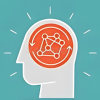
Reviews
There are no reviews yet.